Belonging

Why Belonging?
A sense of crisis?
A decline in attendance, an increase in fixed term and permanent exclusions, high rates of children and young people experiencing poor mental health, an increase in EBSA and children being taking out of school to be home-educated… and C&YP reporting lower levels of safety, engagement and sense of belonging in school.
All of this is magnified if a child is disabled, has special educational needs, from some ethnic groups, identify as LGBTQ , in receipt of pupil premium or living in poverty.
And, of course, it is not just about pupils...
- Staff workload etc. impacting mental health and well-being and leading to challenging recruitment and retention.
- Since Covid it is said that unwritten social contract between schools and parents has broken down for some families with some schools struggling to engage with parents...
Belonging matters
Belonging is a fundamental human need, innate in all of us and based in evolution. An absence of belonging deeply impacts our health and wellbeing.
Felt safety and a sense of belonging in school are crucial for attendance, engagement, learning, attainment and achievement, as well as for self-esteem, mental health and overall wellbeing.
A growing body of evidence indicates that when belonging is a school’s guiding principle...
- More young people experience a sense of connectedness and friendship, perform better academically and come to believe in themselves.
- Their teachers also feel more professionally fulfilled.
- Their families more accepted.
Addressing a sense of school belonging has been found to close the achievement gap by between 50- 60% and has benefits that stretch into adulthood. The presence of school belonging in adolescence is also linked to positive long-term outcomes for adult mental health and the likelihood of future education and employment opportunities.
...school is somewhere that our children need to feel safe, to feel unconditionally accepted for who they are and to feel successful, and to know that they matter.
If they don’t get that sense of belonging with us, children and young people will find that sense of belonging somewhere else.
Jarlath O’Brien
Belonging is a fundamental human need, innate in all of us and based in evolution. An absence of belonging deeply impacts our health and wellbeing.
To date it could be argued that belonging has been ignored - Professor Kathryn Riley has described it as ... "...I've come to the conclusion that many of our children and young people have been let down by policymakers in three spectacular ways":
- Evidence about the benefits to young people of feeling a sense of belonging in school has been largely ignored
- The impact of exclusion and a sense of not belonging on individuals and society has not been recognised
- In a climate of shrinking funding and increasing demand teachers and school leaders are being driven by performance targets, not by the needs of young people
More recently and post Covid, the growing realisation that many of our chiildren and young people do not feel a sense of belonging (now approaching 1 in 3) has focused attention.
As this written (in Summer 2025) there is a lot happening - Amongst others, The National Children's Bureau have been exploring Belonging in their Belonging Matters study with schools in London (reporting by the end of 2025); The ImpactEd group have been looking into attendance and school engagement.
Their recent publications have made for sober reading.
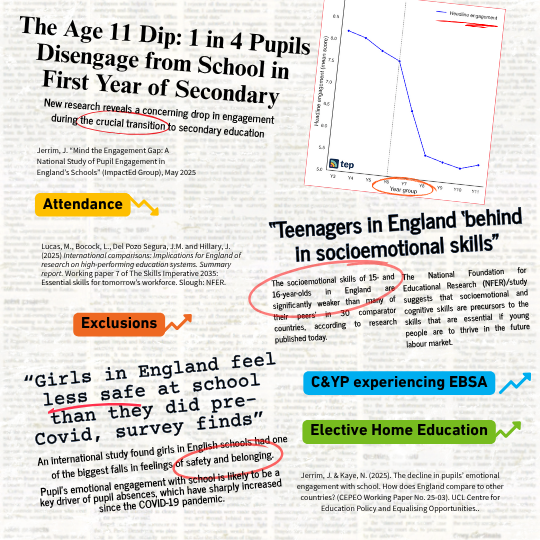
Belonging and Attendance

Understanding Attendance. Findings on the drivers of pupil absence from over 30,000 young people in England, ImpactEd, January 2024
Ways forward to address attendance?

Understanding Attendance. Implementing strategies with impact: lessons from over 70,000 pupils on improving school absence, ImpactEd ,July 2024
Inclusion and Belonging
Inclusion and belonging are closely linked. You cannot have one with out the other.
Inclusion - being present and supported
Inclusion is about ensuring every pupil can access the curriculum, participate in school life, and receive the support they need.
It focuses on removing barriers related to learning, identity, language, ability, or background.
Example: A pupil with SEND is supported to learn in the classroom alongside their peers.
Belonging - feeling valued and connected
Belonging is about how pupils feel—whether they experience school as a place where they are accepted, respected, and matter.
It’s about the relationships, culture, and climate that make children feel safe to be themselves.
Example: A child says, “People here get me. I feel like I fit in.”
Inclusion - focuses on access, is built through policy and practice and asks 'Are all pupils here and supported?'
Belonging - focuses on connection, is felt through relationships and culture and asks 'Do all pupils feel seen, safe and valued?'
Inclusion gets pupils through the door, belonging keeps them engaged, learning, and thriving.
We need both to help every child flourish.
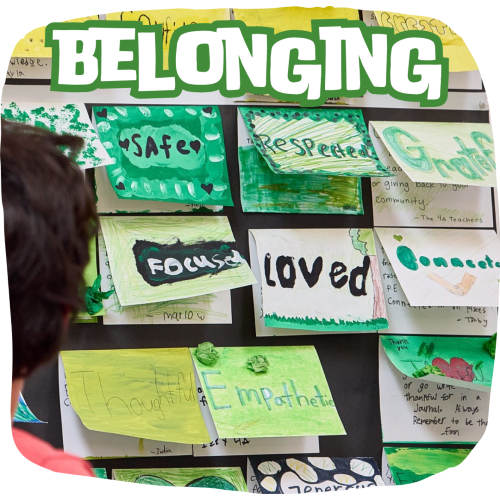
About Belonging
Factors that influence belonging
- Teacher / pupil relationships
- Peer relationships / peer support
- Parental support
- Extracurricular opportunities
- School climate and safety
- Personal characeristics and demographics
Perhaps the most important factor is teacher / pupil relationships, particularly perceived empathy, availability and emotional support. But teachers face "challenges from competing policy agendas, workload pressures, a shrinking sense of professional autonomy and growing disenchantment" (Riley 2017). Alongside the significance of teacher / pupil relationships research is also very clear about the importnace of each child having someone to talk to at (an emotionally available adult).
Positive peer interactions and peer support are also hugely significant. Extra curricular opportunities are also important for belonging in part because they can foster good relationships and friendships. Children also report that taking part in after school clubs etc helps them feel that are have contributed something to school life.
The role of parent support for the child is a given and it is also important to ensure parents and carers are welcomed and engaged in school life.
School climate (aka ethos, environment) - with the fairness of policies / interactions between staff and pupils often cited. At. the heart of everything is the importnace of feeling safe (feeling safe, not just being safe). The importance of 'felt safety' - physical, emotional , social , cognitive - cannot be underestimated. "In order to belong you have to feel safe".
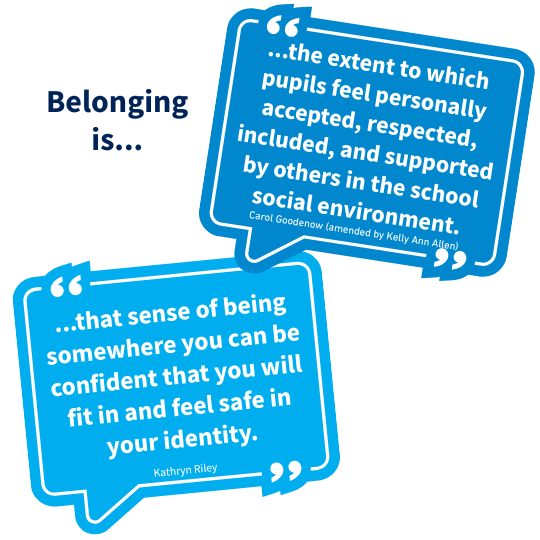
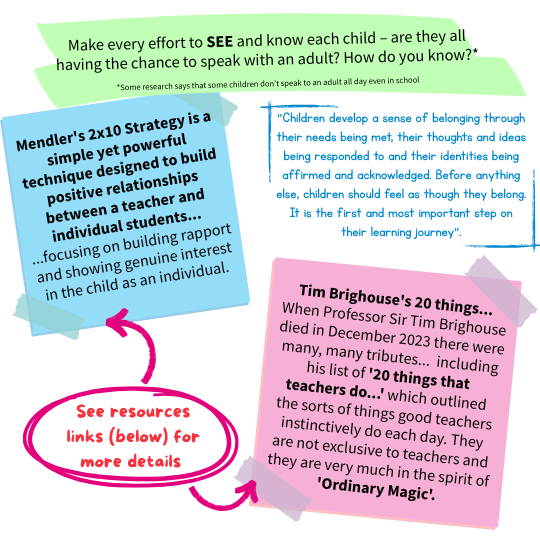
What works to support a sense of belonging
- High standards / academic support
- Fair and consistent policies
- Parent / community engagement
- For children to have someone to talk to (one emotionally available adult)
- Support and CPD for teachers / school staff
- Pupil voice / agency and children's rights
- Social and Emotional Learning (SEL)
- On going and intentional actions not one-offs.
What works is, not surprisingly, related to the factors that infuence a sense of belonging. It is also not a surprise to find that what works is very closely related to a Whole School Approach to wellbeing,. Success in creating and maintaining a sense of belonging for all in the school community is founded on safety, connection and relational approaches which are 'everybody's business'.
A sense of belonging is created by many people and many factors. It is about creating the 'we' (Jean Gross) or the 'tribal primary classroom' (Bethune). It is a dynamic process and is not just about tokens or slogans or branding. It can't be enforced and it can't be achieved through conformity.
Support in Cornwall
There are teams and colleagues across the council who can support best practice. E.g.
- The excellent Parent Engagement Framework
- The Education Psychology Service have some outstanding relational policy guidance
- Our Right On Children's Rights Team and the Rights Respecting Schools support offered
- A new Brilliant ME! teacher resource (to compliment the Brilliant ME! journal) will be released in the 2025 Autumn term.
- A countywide working party of schools, MATs, council colleagues and wider partners is looking at reducing exclusions.
- The Boingboing Resilience Framework is closely linked with beloinging and we offer support around felt safety and protective behaviours
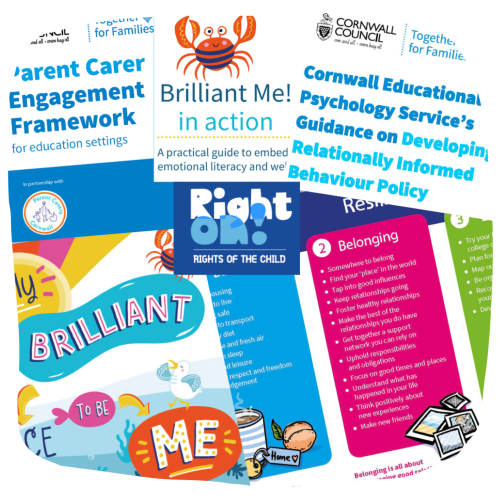
Thinking about belonging in your school
Questions to ask

Professor Kathryn Riley at UCL has done some outstanding work on belonging. In her contribution to the excellent 'Square Pegs: Inclusivity, compassion and fitting in. A guide for schools' (see resources / references below) she suggests three questions for schools to "think about to help understand the part they play in ensuring all children and young people experience a sense of physical and emotional safety - key aspects of belonging..." (p175)
- What do you see?
- What do you know?
- What do you do?
What do you see?
What do you know?
What do you know about the decline in the sense of belonging for our young people in schools, including your own? Are you aware of the evidence for the benefits of a sense of belonging and the impacts of exclusion and not feeling you belong?
What do you do?
Where is your current practice? Is the school ethos and culture supportive of belonging? Are pupil / teacher relationships considered? are all children able to access the benefits of after school clubs, is bullying or inappropriate sexual behaviour happening? Do families feel welcome? Is staff wellbeing supported? Is belonging 'everybody's business'?
Explore a sense of belonging with C&YP
Ask
A conversation is a good starting point. These conversation cards from Kelly Ann Allen (another key leader in the field of belonging) are designed to explore belonging (KS2 up)
Professor Kathryn Riley's work has a rich seam of creating student (and staff) researchers to help explore belonging in schools. The book, 'Place, Belonging and School Leadership: Researching to make the difference' contains a description of, and results from research carried out in a number of schools involving students at the heart of the research. It also includes, 'Our Knowledge Quest' - materials for student-researchers that have been used with primary and secondary ages. (Appendix II).
Kyle Schwartz (known for the outstanding 'I Wish My Teacher Knew') in her book 'I Wish for Change: Unlealeashing the power of kids to make a difference' explores how to equip children and young people with the tools and resources to allow them have voice and agency, with an emphasis on recognising that 'it all starts with belonging' (Chapter 3).
How do adults know if we have effectively created the conditions for belonging?
Ask.
Schwartz suggests 'spark the conversation' question prompts. For belonging they include:
- How do you know you belong?
- How can you help others feel like like they belong?
- How do you contribute to your community?
We have created a simple 'Exploring a Sense of Belonging' resource (Draft) to help open up conversations about belonging.
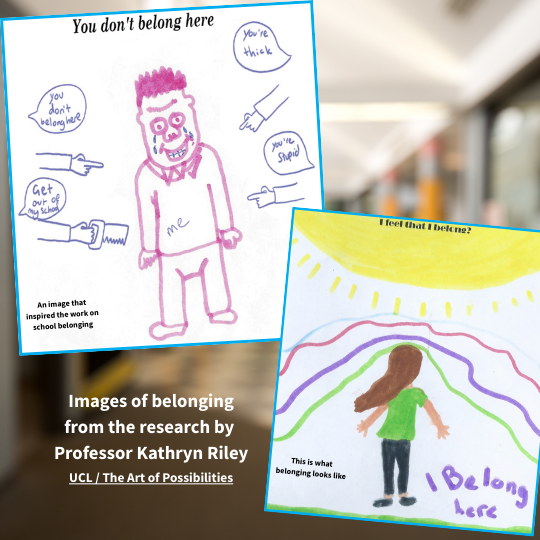
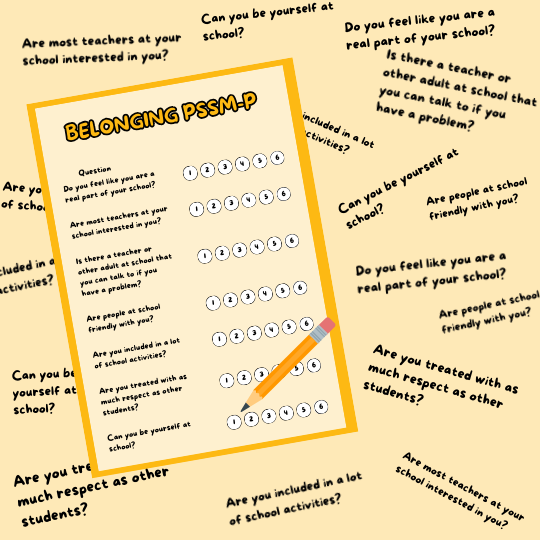
Explore a sense of belonging with C&YP
Tools/Scales
There are some well established, easily accessible tools used to measure belonging:
The Psychological Sense of School Membership (PSSM) created by Carol Goodenow (1993)
The (PSSM) scale consists of 18 items. Students rate the extent to which they agree or disagree with each item, on a scale ranging from 1 to 5, where 1 indicates Not at all true, and 5 indicates Completely true.
The scale measures YP perceptions of sense of school belonging investigating associations between the relational quality of educational contexts and motivational and achievement outcomes.
The Psychological Sense of School Membership Scale Primary (PSSM-P)
The Psychological Sense of School Membership Scale Primary (PSSM-P) is a modification of the original 18-item PSSM, which has been found to be a reliable and valid measure of school belonging for primary school children in the UK.
School Connectedness Scale
Another similar and quite frequently used scale is the School Connectedness Scale (SCS), see O'Brennan & Furlong (2010) and Loukas et al. (2012). This has 5 items, with a response scale of strongly disagree (1), disagree (2), neither disagree nor agree (3), agree (4), and strongly agree (5)
Research / Background
Recent research / reports from the UK
Belonging Matters - National Children's Bureau
including literature / interim resporting on pilot study
October 2025 NCB have published the final report on the pilot with some impressive results . Here is a pdf of the key findings
ImpactEd Work on Attendance and Engagement
The National Education Union (NEU) commissioned research, 'Place and Belonging in School: why it matters today'
Includes research findings and case studies
Belonging Schools (Teach First)
How do relatively more inclusive secondary schools approach and practise inclusion?
Recommended Reading
- Creating the ‘we’ – how to build students’ sense of belonging in your school (secondary)
- Creating the 'we': Ideas for building pupils’ belonging in school (primary)
Square Pegs: Inclusivity, compassion and fitting in – a guide for schools by Fran Morgan with Ellie Costello and edited by Ian Gilbert
Voice and Agency for Children and Young People
I Wish for Change: Unleashing the Power of Kids to Make a Difference by Kyle Schwartz
More about belonging more generally
Braving the Wilderness: The quest for true belonging and the courage to stand alone by Brene Brown - 'True belonging doesn't require you to change who you are; it requires you to be who you are'.
Useful Resources
Empathy is a learnable skill, not a trait. Our powerful, evidence-based approach harnesses the power of reading to develop empathy. We’re a charitable social enterprise. Our mission is to reach one million children a year by 2026 who are inspired to build a better world for everyone.
Belonging in School resources, Cambridge University
These free resources offer tools that schools and educators can use to revise or develop policies for educational inclusion, particularly as they pertain to learners with neurodevelopmental differences.
Coram Life The Belonging Toolkit For KS2 & KS3
The Belonging Toolkit is free to schools and was co-produced between Coram Life Education and Coram's Young Citizens - young people from migrant and refugee backgrounds - who gave invaluable insight into the experiences of migrant children and young people.
The Manchester Inclusion Strategy Toolkit and Audit Tool
Reducing Exclusions Through the Lens of Belonging: A Toolkit for Schools and Educational Settings (South Gloucestershire EPS, 2024)
The wonderful and much missed Professor Tim Brighouse wrote this wonderful list of relational practice, 'ordinary magic' and a recipe for belonging when I was a trainee teacher and is still as powerful today as it was then... and a wonderful demonstration of how wellbeing in schools can be 'everybody's business'.
Allen Mendler's 2 x 10 strategy is one example of a simple yet powerful technique designed to build positive relationships between a teacher and individual students, particularly those who are disengaged or challenging. The strategy involves spending 2 minutes each day for 10 consecutive school days having a positive, informal conversation with a specific student. The conversation should be about anything other than school work or behaviour, focusing purely on building rapport and showing genuine interest in the child as an individual.
Mendler, A. Connecting with Students, 2001 (book)
Story books
This is an excellent blog from Dr Lisa Cherry on children's books for belonging.
Empathy Lab UK have an excellent recommendations in their Reading for Empathy collections
Conceptual PlayWorlds for Belonging (Storybooks and Resource Book) by Kelly-Ann Allen, Marilyn Fleer and Lara Mckinley. (Speechmark books)
Fostering a sense of belonging in early childhood is crucial for the development and wellbeing of young children. This practical resource and accompanying story books is for use with children aged 4-8 to help build strong connections and a sense of belonging.
Stories: The Lonely Little Cactus: A story about friendship, coping and belonging; School is where we all belong: A story about building a sense of belonging outside of home; Mia Belongs Here: A Story About Family, Home and a Sense of Belonging.
A Little Spot of Belonging: A Story about being true to yourself and making friends by Diane Alber (KS1)
What Are They Feeling?: The adventures of an empathy detective (The School of Life) (KS2/3)
Children develop a sense of belonging through their needs being met, their thoughts and ideas being responded to and their identities being affirmed and acknowledged. Before anything else, children should feel as though they belong. It is the first and most important step on their learning journey. (NEU 2020)
Key researchers in school belonging
Carol Goodenow
Dr Goodenow provided the widely used definition of school belonging and developed the Psychological Sense of School Membership (PSSM) scale to measure it. Motivation and Achievement:Goodenow's research demonstrated a significant link between a sense of school belonging and higher academic motivation, greater effort, and improved academic performance, independent of the influence of friends' values.
Kerry Ann Allen
Dr Allen focuses on the practical application of belonging theory. While building on the foundational work of researchers like Carol Goodenow, Allen's research and publications are aimed at helping educators, practitioners, and leaders understand and foster a sense of belonging in school communities.
Her key contributions include:
-
Translating Research into Practice: Allen co-authored the book Boosting School Belonging: Practical Strategies to Help Adolescents Feel Like They Belong at School, which provides evidence-based activities and frameworks for teachers and psychologists.
-
Broadening the Scope: Her work extends beyond traditional academic belonging to examine how school belonging relates to student mental health, social connectedness, and long-term well-being.
-
The Power of Relationships: Allen emphasizes that relationships, particularly with teachers and peers, are a crucial element in a student's sense of belonging.
-
Socio-ecological Framework: She has used this framework to explore how different layers of a student's environment—from individual characteristics to broader school systems—influence their sense of belonging.
Kathryn Riley
Professor Kathryn Riley is an expert in urban education and her work on school belonging is centered on leadership and whole-school culture. She argues that belonging is not a passive feeling but a deliberate outcome of a school's ethos, policies, and practices.
Her key contributions include:
-
Leadership for Belonging: Riley's research introduces the concept of "compassionate leadership" as a vital component for cultivating a sense of belonging. She asserts that leaders must actively create a climate of welcome and inclusion for all members of the school community, including students, staff, and families.
-
The Prism of Place and Belonging: She developed this framework as a tool for schools to assess how daily life is experienced, identify who feels included or excluded, and create a roadmap for change.
-
Five Principles of Belonging: Her work outlines five key principles—Safety, Presence, Voice, Connectivity, and Agency—as the essential components that shape a sense of belonging for students.
-
Moving Beyond the Individual: While she acknowledges the benefits for individual students, Riley's work is distinct in its focus on how school-wide systems and leadership can address issues of alienation, exclusion, and social division.
Belonging and Oracy
We have recently been exploring the role of oracy in supporting pupil wellbeing and in Social and Emotional Learning. It is also important to belonging. So it was good to see mention of Oracy in the curriculum review. Building a World-Class Curriculum for All: Final Report. Nov. 2025
Oracy and belonging are closely connected, with oracy playing a fundamental role in cultivating a sense of inclusion for pupils. Through oracy, pupils are given a platform to express their thoughts, feelings, and ideas, which ensures they feel heard, understood, and truly valued in the classroom environment.
By participating in conversations and discussions, pupils are able to connect with others and share their experiences. This interaction helps to foster a sense of community, allowing each pupil to feel that they are part of something larger and that their contributions matter.
Oracy also supports the development of self-expression and agency among pupils. These are vital elements in building a child's sense of belonging, as the ability to communicate effectively allows them to assert themselves and develop confidence in their interactions.
Furthermore, oracy encourages pupils to become attentive listeners and to participate in informed argument. This not only helps to build civic engagement and promote civility, but also contributes to the development of respectful and thoughtful communication within the school community.
'The impact of oracy extends to pupils' overall well-being. By equipping pupils with the skills and confidence to speak up and believe in themselves, oracy enhances self-confidence, social competence, and mental health. This is particularly significant for children experiencing disadvantage, those with special educational needs and disabilities, and those who are structurally under-served, for whom the opportunity to express their voice can be especially empowering'.
Belonging and a sense of place - Myth makers
The Myth makers project, created by Jon Roberts in partnership with Cornwall Library Service was intended to build on the thinking behind My Brilliant Place to be ME!
We wanted to encourage children to explore and understand more about the places where they are living in Cornwall. Not only to find out about the myths and legends of their local area but to also to consider and create their own myths and make each place more connected to them and their families.
The project traveled the length and breath of the county enabling children and their parents and carers to focus on the their local area and share tales old and new.
The level of engagement of adults and children sharing local stories and highlighting opportunities for new stories based on their patch was delightful to see and demonstrated the potential of building belonging and a sense of place.
Our thanks to:
Jon - for creating such a brilliant idea and making it happen to such good effect.
Cornwall Library Service - for hosting the sessions and produding the booklet.
All the children and parents involved who created such a fabulous collection.
Explore the Myth Makers Stories
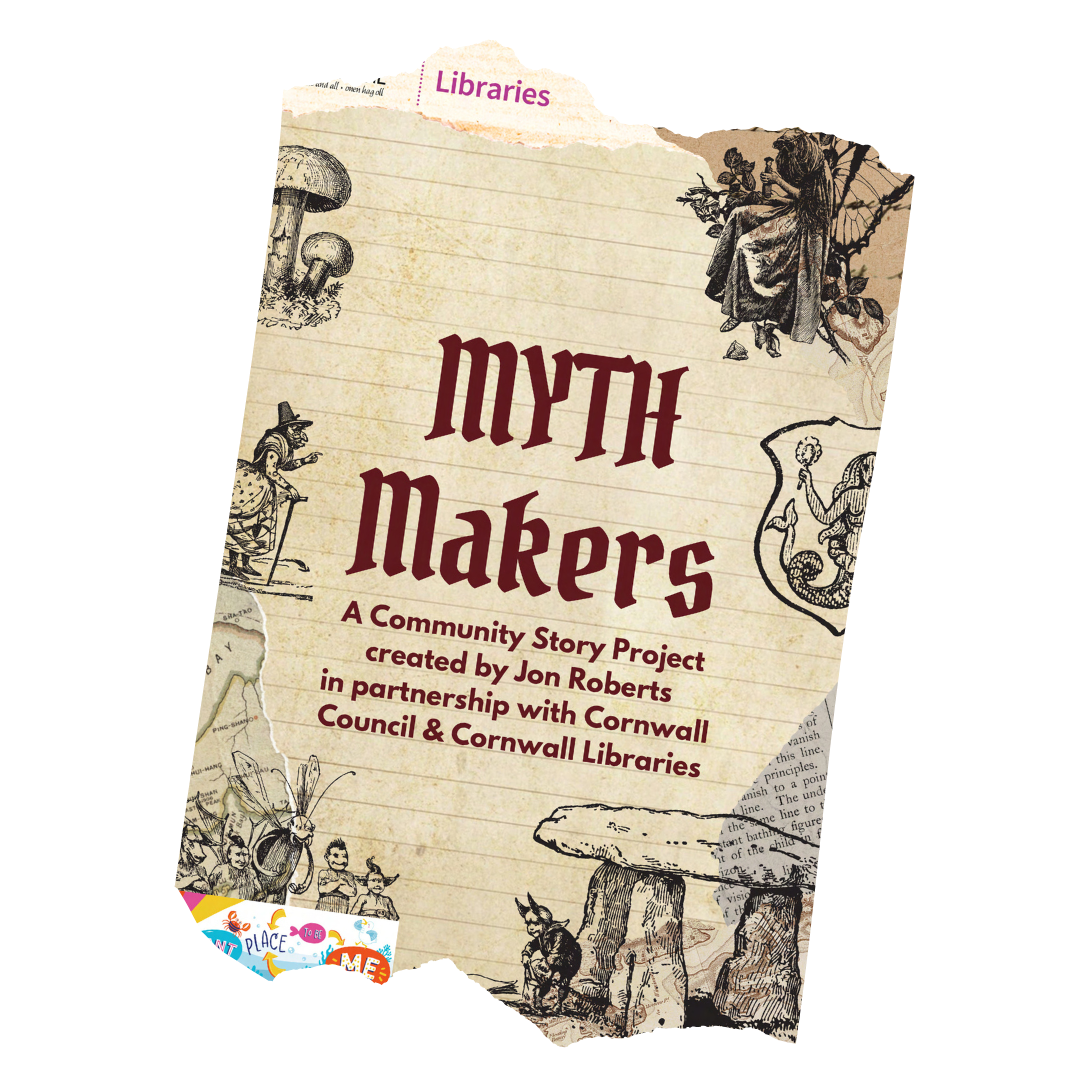
Videos
Belonging and the concepts of Whakapapa and Ubuntu
In recent years there has been interest in understanding the concept of belonging in other cultures. Notably, Owen Eastwood, in his book - applies the Māori concept of Whakapapa as a powerful tool to foster a sense of belonging in his work with elite teams and help them perform at their best. He is also being asked to work more and more in education.
“When the signals are telling you, ‘You are seen here, you are included in this, you belong here,’ we are in a completely different hormonal state: anxiety reduces, oxytocin and dopamine - which are very important energising hormones - start to soar. Whether it’s my work with the England football team or my daughter’s school, it makes no difference: the humanity of this is the same.”
Ubuntu is an African philosophy, influencing community interactions, problem-solving, and decision-making. Nelson Mandela and Archbishop Desmond Tutu are associated with popularizing Ubuntu. Ubuntu can be used in the classroom to promote inclusivity and collaborative learning in classrooms based in celebrating diversity, positive positive relationships, and supportive environments.
Read more (pdf)

